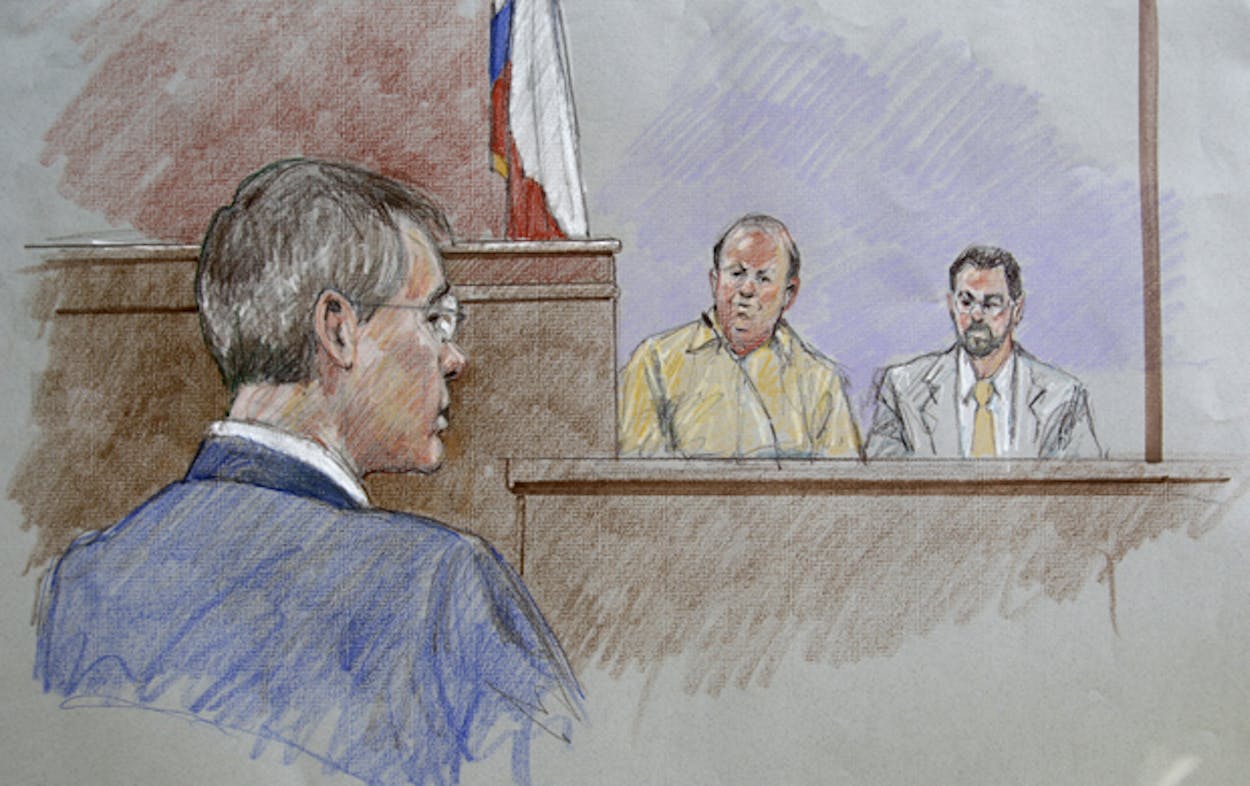Forget Casey Anthony. Texas served up enough bizarre courtroom drama this year to keep Nancy Grace drooling. Here are the five cases from Texas courtrooms in 2011 that enthralled, amused, and horrified us.
1. Warren Jeffs
The August sexual assault trial of polygamist leader Warren Jeffs (sketched above) in Tom Green County Courthouse was surely the courtroom spectacle of the year.On the first morning of jury selection, Jeffs stunned onlookers with his announcement that he had (again) fired his legal team and now wanted to represent himself. Jurors, the press, and a crowd of interested San Angeloans spent the next two weeks listening to the state meticulously laying out its case that Jeffs had sexually assaulted two underage girls he had taken as his “spiritual wives.”
Jeffs’ defense amounted to a series of bizarre, lengthy monologues, long periods of silence, and even a threat from God, leading Texas Monthly‘s Katy Vine to dub the proceedings “one of the most bizarre trials in U.S. history” in her definitive magazine piece on the trial from October. (For more from the courtroom, read Vine’s web dispatches from San Angelo.)
Jeffs was ultimately convicted and is serving out a life sentence, and the Dallas Morning News named the team of Texas Rangers, prosecutors, and CPS workers who made the conviction possible as among the newspaper’s finalists for Texans of the Year.
2. Michael Brown
Infamous former hand surgeon Michael Brown had his second very public trial in ten years this September. Brown, accused of assaulting his fourth wife with a humanitarian award, was ultimately acquitted with the help of famed attorney Dick DeGuerin. But not before gobs of unsavory details about their private lives came to light, including information about the couple’s plentiful household help and testimony about Rachel Brown’s relationship with former Houston Astro Jeff Bagwell.
The Houston Chronicle‘s Brian Rogers faithfully followed the drama from the courtroom and the Houston Press‘ Craig Malisow delved into Brown’s bizarre and violent history for an October cover story. The Browns’ divorce is still ongoing, so 2012 could see more courtroom fireworks.
3. Jamie Leigh Jones v. KBR
The legal saga of Jamie Leigh Jones, the former KBR contractor who said several of the company’s employees drugged and raped her in Iraq in 2005, came to an end in July when a federal jury in Houston rejected her claims. Lawyers for the company punched holes in her story and introduced evidence that called her credibility into question. It took the jury a day and a half to determine that she had not been assaulted by the accused.
Jones, who claimed KBR created a “sexually hostile work environment,” was seeking some $114 million in punitive damages from the company. She had fought for years to have her case heard in court, as her contract required such claims to be handled through arbitration, and while a federal grand jury previously looked into Jones’ claims, it did not indict anyone.
4. Redistricting
Courtrooms in San Antonio and Washington, D.C., were busy this year hashing out what would become of the new redistricting maps put together by the Texas legislature.
The Department of Justice frowned upon the Texas maps in September, finding they diminish the power of the state’s growing Hispanic population. In November, the D.C. District Court, worried that the court battle would not be neatly wrapped up by the time primary season rolled around, tapped a three-judge panel at a San Antonio federal court to draw up some maps that could be used in the 2012 election cycle. The interim maps gave Democrats more seats than the Legislature’s, which upset Texas Republicans, who, under the original maps, would have picked up three of the four new seats.
Texas Attorney General Greg Abbott appealed the case to the Supreme Court, with the big showdown in the nation’s highest court scheduled for January 9.
5. Wit & Wisdom of Judge Sam Sparks
Austin-based U.S. District Judge Sam Sparks, upset after some attorneys dragged him into a discovery dispute, issued a hilarious order in August inviting them to a “kindergarten party,” which would feature “exciting and informative lessons” including “an advanced seminar on not wasting the time of a busy federal judge and his staff because you are unable to practice law at the level of a first year law-student.”
The “kindergarten party” never happened, as the parties in the lawsuit independently resolved their issues, the Wall Street Journal‘s Law Blog reported. However, Edith Jones, Chief Judge of the U.S. Court of Appeals for the Fifth Circuit, was unamused by Sparks’ moment of levity, dubbing the order “cute” and finding Sparks’ rhetoric so “caustic, demeaning, and gratuitous that it casts more disrespect on the judiciary than on the now-besmirched reputation of the counsel,” Above the Law reported.






